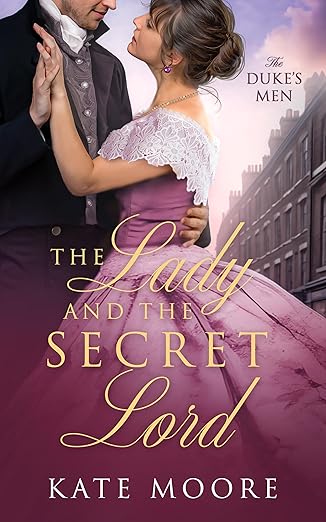Today it is my pleasure to Welcome author Kate Moore to HJ!

Hi Kate and welcome to HJ! We’re so excited to chat with you about your new release, The Lady and the Secret Lord!
To start off, can you please tell us a little bit about this book?:

Former beat cop Robin Jones jumps at the chance to work a case that could prove him worthy to join the ranks of Scotland Yard’s first detectives. But dealing with independent-minded Phoebe Marchmont is more than he bargained for, and finding the missing boy takes him back to his youth as a troubled street urchin when he was one of the Duke of Wenlocke’s lost boys with no family and no name.
Robin and Phoebe’s search for her young brother moves from vibrant, decadent Soho to glittering ballrooms and the foggy banks of the Thames, peeling away the disguises of the two stubborn lovers and opening their hearts.
Please share your favorite lines or quote(s) from this book:
“What am I to call you?” he asked. His voice sounded rough in his ears.
Her chin came up. Her defiant gaze met his. “You mean if you decided to be polite and respectful and observe the distinctions of rank?”
He took a step toward her. “I mean,” he said, “if you decided to observe the proprieties that govern a lady’s behavior, that keep her reputation and her person safe, Lady Phoebe.”
“I don’t like lady,” she said. “It is a title tighter than this corset.”
He laughed. “That corset would fall off you without the padding.” He wished it would. He wanted to see her true waist, to measure it with his hands.
What inspired this book?
The Lady and the Secret Lord has its source in an earlier trilogy I wrote that featured a gang of Lost Boys and their leader living on the rooftops of a London rookery, or what we would call, a slum. Readers wanted to know what became of those boys when their leader came into his true identity as heir to the Duke of Wenlocke. There’s a bit of Peter Pan and his gang in these stories, and something of the film Lion, which perfectly captures the dilemma faced by my hero, Robin Jones–When you don’t know where you come from, how can you know where you belong?
Scotland Yard’s early history also had a part in shaping this story. The citizens of London did not welcome their new police force readily, and resisted the idea of plain clothes detectives.
How did you ‘get to know’ your main characters? Did they ever surprise you?
Each of my books begins with the characters speaking to each other as I eavesdrop on the conversation. Robin Jones, at the wedding breakfast for his friend Raven, is thinking to himself that he has a family, a found family, but that his real identity, the identity he will stubbornly cling to throughout the story, is as the detective he wants to become. His stubborn resistance to seeking his birth family kept me thinking about how I could get him to change.
The privileges of being an earl’s daughter cannot spare Phoebe Marchmont from her share of life’s losses, but she has a stalwart friend in her housekeeper, Mrs. Kendall. Phoebe is like every young woman who feels herself capable of directing her own life, but she finds that being a lady confines her in unexpected ways. For Phoebe the problem of how to take charge of her own life comes to head when a year’s search for her missing young brother leads nowhere.
What was your favorite scene to write?
My favorite scenes are the ones in which Phoebe surprises Robin and throws him off balance with her independence and determination.
Phoebe allowed Robin to lead her to the middle of the dance floor. He was Mr. Jones now, not Jones, a return to the distance of their first day. Around them couples found places for the set. As soon as they were out of earshot of her companions, he asked, “What are you doing here?”
“Being a lady as you suggested. What are you doing here?”
“Think of me as a potted palm. I came to observe.”
She quirked a brow. “Seriously, did you come to tell me you found Andrew?”
“Trusted men are searching for him tonight.” He wished he had happier news.
Her disappointed gaze dropped to his black evening shoes.
They took their places in the set, facing each other in the center of the room, separated by a few yards of chalked floor, and an abyss of rank. He had called her Mrs. Kendall and then Phoebe, but now he saw fully for the first time that she was this other person, a lady, daughter and sister of earls. By birth he was a man without rank, without even a name, except the name Wenlocke had given him. If he had any place at the Huntingdon ball, it was as a policeman, an outsider, there to find a killer. He would do well to remember his purpose.
When the line of couples stretched the length of the room, the musicians struck the opening bars of a familiar tune. The buzz of conversation faded. Heads began to nod and feet to tap to the beat. Abruptly Phoebe’s gaze left his shoes and flew to his face. “Do you dance?”
The question stung. This was her world, not his. On his own, apart from Wenlocke and the duchess, he had danced in the alehouses of Holborn to a blind fiddler’s tunes with girls whose faces he could not remember. “You think policemen can’t dance.”
“That did not come out right. I meant you. Do you dance? Dancing requires a partner.”
What was the most difficult scene to write?
The confrontation with the villain was the most difficult scene to write. A villain has to be a huge obstacle and hard to overcome. Everything has to be at stake–especially, the characters’ identity, their love for each other, and their lives. The hero and heroine have to be smart, self-sacrificing, and a little bit wrong in how they handle the situation to keep readers turning those pages late into the night.
“You are someone’s by-blow, aren’t you Jones? A man who counts for nothing in London. You and that entire absurd police force of yours have not the wit among them to bring me down.” A sly cast came over Bolton’s features. “You might even be one of my by-blows.”
There it was, the old slur, the thing about Robin’s past that he had resisted knowing from the moment he under- stood that he and his mother were alone in that London street. He had wondered for years what sort of father abandoned a wife and child. Bolton had named the precise fear that Robin had never spoken, not even to Wenlocke, that he, Robin, might be a bastard, and that his father refused to claim.
He looked at Phoebe, and it didn’t matter. He could see her clearly now. She wore no disguise, only her fierce love for her brother that made her willing to stand up to Bolton, her gloved hands clenched, her posture one of unflinching readiness. Robin straightened. He was who he was, a detective. He needed no other rank and no name of distinction to stop a murderer.
Would you say this book showcases your writing style or is it a departure for you?
The Lady and the Secret Lord is very much in the style of my sweet romances, but because the hero, Robin Jones, is training to be one of Scotland Yard’s first detectives, there’s a mystery to solve! I have read/watched hundreds of British mysteries, what could be hard about writing one I thought? Now I know! The writer can’t be Watson, but has to be Holmes, seeing and sensing every detail, spotting what could be a clue, figuring out how to introduce it, and knowing when that clue will finally reveal its significance to detective and reader.
What do you want people to take away from reading this book?
The fun of following the twists and turns of a mystery and the joy of two people discovering in each other the one who inspires them to be most themselves.
What are you currently working on? What other releases do you have planned?
The Lady and the Secret Lord introduces three of the heroine’s school friends, a group of “gifted” working women employed by Greenwood’s Almanac as a weather predictor, an illustrator, and a legal expert. Each has an extraordinary gift that she risks losing if she falls in love, so, of course, each is tempted by a particularly intriguing gentleman.
Thanks for blogging at HJ!
Giveaway: Winner will receive one ebook copy of THE LADY AND THE SECRET LORD from Tule Publishing plus one additional ebook from Tule Publishing of the winner’s choice.
To enter Giveaway: Please complete the Rafflecopter form and Post a comment to this Q: How do Phoebe and Robin discover themselves through their partnership?
When do you feel most like yourself? Is it in doing work that you are called to do? Is it in the company of people who bring out the best in you?
Excerpt from The Lady and the Secret Lord:
Prologue
Verwood HallWormley
Sunday, the third of October, 1835
No one asked him, but Robin Jones thought a wedding breakfast at a country house a most unlikely place for a London copper. Verwood Hall, stately and solid, rose behind the guests, its windows flashing in the sun of a golden October morning. Robin felt the warmth of it on his shoulders. Around him a few last stragglers found their places in the crowd of friends and neighbors. In the center of the guests, the Duchess of Wenlocke knelt down, blue silken skirts trailing in the grass, her gloved hands cupped to receive an offering from a small girl in pink, as she had once received Robin’s offering at Daventry Hall. That day he had given her a toad he believed to be a baby dragon. She had accepted the gift and more, his solemn belief in the possibility of dragons. He knew better now.
On the other side of the head table, the Duke of Wenlocke stood waiting to toast the bride and groom, with an air of calm command, as if he could slow time itself, letting his duchess freely bestow her kindness on the child, until the girl scurried off. The duchess straightened, her hands still holding the gift, and made her way to her husband’s side. She tipped open her palms to show him the object, and he smiled at the treasure. Then he lifted his glass and looked about, finding each of them, the lost boys who had been his companions in the darkest rookery of London, whom he now counted as brothers. Nearly all of them had come together to toast one of their own. Lark was there with Viv, his soon-to-be bride, and Jay Kydd, who had been Raven’s closest friend in their youth, and Swallow, Finch, and Robin. Only Rook was missing, having traveled to the other side of the world to begin a new life.
Raven and his bride sat gazing at each other, set apart by the glow of their spirits. Raven was obscenely rich and perfectly happy. He, like the rest, most lately Lark, had been reunited with the family he’d once lost. Many summers before, Wenlocke had offered to use all the resources available to him as duke to find the boys’ families. And he had. Only Robin steadfastly refused the duke’s offer. He wanted no other names than the ones Wenlocke had given him in the rookery—Robin and Jones. He did not need to find the people who had lost him all those years before, whether from indifference or carelessness or simply misfortune. He had a family.
He raised his glass. These were his brothers. This was his family. He wished them every happiness, but their happy endings were not for him. Being overdressed and overfed and making polite conversation with the local beauties made him restless. There was not a coiner, a receiver, a housebreaker, or a cosh-carrying thief in the lot. A wedding party was no place for a detective. As cheers and laughter followed the duke’s toast, what Robin wanted was a dose of London. He wanted fog and dirt and noise and river stink and something like a good murder to solve. As soon as the happy couple departed for their wedding trip, Robin would head for London, for Scotland Yard.
Excerpt. © Reprinted by permission. All rights reserved.
Book Info:
In 1835 London, two stubborn souls from separate worlds clash and collide to find a missing child.
When a threatening message warns Lady Phoebe Marchmont to stop searching for her missing younger brother, the Earl of Grafton, she rebels. Donning a disguise that permits her to move freely about London despite her youth and station, she entreats one of Scotland Yard’s secret detectives to assist her—but she wants to be involved with the investigation.
Former beat cop Robin Jones jumps at the chance to work a case that could prove him worthy to join the ranks of a secret group preparing to be Scotland Yard detectives. But finding the missing earl threatens to expose Robin’s youth as a troubled street urchin when he was one of the Duke of Wenlocke’s lost boys. Of the seven, he was the only one who refused help to find his family. Now Robin must face his past to help the determined and witty Lady Phoebe find her brother.
The search moves from vibrant, decadent Soho to glittering ballrooms, peeling away their disguises and opening their hearts.
Book Links: Amazon | B&N | iTunes | Kobo | Google |
Meet the Author:
Kate taught English Literature to generations of high school students, who are now her Facebook friends, while she not-so-secretly penned Romances. In Kate’s stories an undeniable mutual attraction brings honorable, edgy loners and warm, practical women into a circle of love in Regency England or contemporary California. A Golden Heart, Golden Crown, and Book Buyers Best award winner and three-time RITA finalist, Kate lives north of San Francisco with her surfer husband, their yellow Lab, toys for visiting grandkids, and miles of crowded bookshelves.
Website | Facebook | Twitter | Instagram | GoodReads |


erahime
How do Phoebe and Robin discover themselves through their partnership?
When each began to believe and acknowledge more about themselves as the other person has a different viewpoint that they respect.
When do you feel most like yourself? Is it in doing work that you are called to do? Is it in the company of people who bring out the best in you?
When I provide time at a place that brings me joy.
janinecatmom
I feel more myself when it’s just me and my husband. I can just be myself. No worries about how I look or how I act.
debby236
I feel more like me when I am with my grandsons. They bring out the joy to life.
Glenda M
It’s hard to answer the first part of the question without having read the book, but I think that having to work towards something usually helps you discover more about yourself.
I feel most like myself when I’m with my immediate family and my pets.
Amy R
When do you feel most like yourself? Is it in doing work that you are called to do? By myself or with close friends and family
Is it in the company of people who bring out the best in you? By myself or with close friends and family
Bonnie
I feel most like myself when I am doing something I enjoy with family and friends.
Patricia B.
Through the end of college, I was defined by who my family considered me to be and never had the opportunity to “be myself.” It took going overseas in a job where no one knew me and me finding out who I could be without being defined by my past. I feel most like myself when I get to tackle projects I like with people who take me for who I am and not who they think I am or should be.
T Rosado
I feel more like myself when I’m amongst my closest friends. My friends who bring out my silly and authentic side.
bn100
didn’t read it
psu1493
Phoebe and Robin discover themselves through their partnership when they learn to trust each other so they can do what is right for the greater good. I am most myself when I work on a project that can enhance the lives of others.